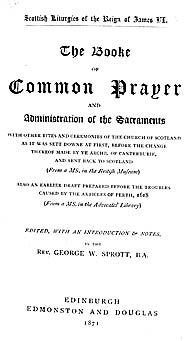Scottish Liturgies of the Reign of James VI
The Booke
OF
Common Prayer
AND
Administration of the Sacraments
WITH OTHER RITES AND CEREMONIES OF THE CHURCH OF SCOTLAND AS IT WAS SETT DOWNE AT FIRST, BEFORE THE CHANGE THEREOF MADE BY YE ARCHB. OF CANTERBURIE, AND SENT BACK TO SCOTLAND
(From a MS. in the British Museum)
ALSO AN EARLIER DRAFT PREPARED BEFORE THE TROUBLES CAUSED BY THE ARTICLES OF PERTH, 1618
(From a MS. in the Advocates' Library)
EDITED, WITH AN INTRODUCTION & NOTES,
BY THE
REV. GEORGE W. SPROTT, B.A.
EDINBURGH
EDMONSTON AND DOUGLAS
1871
PREFACE.
THE MS. of the principal Liturgy in this volume was discovered in the British Museum by the Rev. Alexander Irwin, and was described by him and partially printed in the British Magazine for 1845-6. The earlier draft, printed from the Wodrow MSS., has not been previously noticed, so far as I am aware.
Their place in the history of the Church is stated in the Introduction, where the account of the liturgical movement thus begun, is continued till the publication of the Prayer Book of 1637, and letters shedding light upon the preparation of that Book are now printed for the first time. These documents contribute something to the history of an important period, and are fitted to correct some common misapprehensions, There are points connected with that history which are still doubtful; but among the MSS. in the great Libraries, there are probably papers, the publication of which may yet remove remaining difficulties.
I have had to make inquiries in various quarters, and to put friends to much trouble, and I have now to express my great obligations to those from whom I have received assistance. After examining the MS. in the Museum, I wrote to Mr. Irwin, who is now Precentor of Armagh Cathedral and Chaplain to the Archbishop, and from his most kind and obliging reply, I give a sentence or two :— “I had to give up the idea of editing the interesting Liturgical relic, that seemed to have escaped the research of those who had inquired into the history of the Scotch Prayer Book. You are quite at liberty to make any use you please of the articles in the British Magazine. And I will send you the transcript I made of the MS., which may assist you in revising the work of the printers, or perhaps save you the trouble of getting a second copy completed.” For his kind concurrence with my proposal to edit the Liturgy, I am much indebted to him; while the use of the transcript thus offered, and the articles in the Magazine, have been of the greatest service. I have also to express my great obligation to Dr. Hill Burton, who encouraged me to begin the work, for the interest he has taken in the prosecution of it, and for the great assistance he has rendered me in many ways. To my friends, the Rev. R. W. Mackerfy, of the Caledonian Church, London, who took the copy of the MS. from which the Liturgy has been printed, and made researches for me in the Museum; and A. O. Brodie, Esq., Edinburgh, who copied for the press the MS. in the Advocates' Library, and gave me other assistance, I owe my warmest thanks. I am also much indebted to Dr. Grub, Aberdeen, and Mr. David Laing, Edinburgh, for the loan of books and other aid; to the officials of the British Museum, for a careful examination of the MS. in that Library; to the Librarian at Lambeth, for obliging answers to. inquiries; and to Mr. Dickson of the Register House, and those in charge of the Advocates' Library.
May 1871.
|
Both King James (VI of Scotland; I of England) and his son Charles desired to introduce liturgies into their native Scotland much like the English Book of Common Prayer. These efforts lasted for many years, finally culminating in the ill-fated 1637 Scottish Book of Common Prayer. This book presents a draft of the 1637 book, prepared by Scottish bishops and sent down to London sometime before 1629. In many ways it is quite different from the final 1637 BCP. This may be because what is presented here is just one draft of several, and by no means the last one.
In his extensive introduction, the author puts the "blame" for the final 1637 BCP squarely on William Laud, then Archbishop of Canterbury. However, more recent scholarship has attributed the final 1637 BCP to the Scottish bishops, in particular James Wedderburn, Bishop of Dunblane.

|